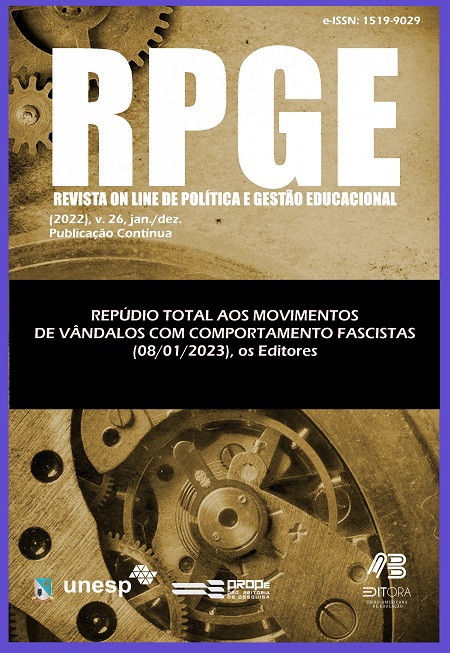Management of internal review processes for the accreditation of academic programs in universities
DOI:
https://doi.org/10.22633/rpge.v26i00.17732Keywords:
Internal evaluation, Academic programs, Higher educationAbstract
The study aims at identifying the reality of the management of internal review processes for the accreditation of academic programs in Saudi universities. A mixed-method approach was used in collecting primary data through the questionnaire and the interview. The questionnaire returned 298 valid responses from academic staff randomly selected from six Saudi universities. Further, six deans of colleges were interviewed. The questionnaire data were analyzed using the Statistical Package for the Social Sciences, while the interview results were thematically coded and synthesized. The overall results of the study the internal evaluation process related to accreditation of academic programs in the universities is primarily based on the overall university academic plan created at the central level. Implementation follows the planning during which various university offices at college and departmental levels were additionally involved. The last phase of the program accreditation is the recurrent evaluation of the system to ensure that the program offerings are in sync with global best practices cultured to the needs of the Saudi Arabian economy.
Downloads
References
ALBAQAMI, S. Implementing Quality Assurance in Saudi Arabia: A Comparison between the MESO and the MICRO Levels at PSU. Higher Education Studies, v. 5, n. 3, p. 66–81, 2015.
ALGUNMEEYN, A. et al. Exploring staff perspectives of the barriers to the implementation of accreditation in Jordanian hospitals: Case study. International Journal of Healthcare Management, v. 14, n. 4, p. 1422–1428, 2021.
ALMALKI, A. M. Blended Learning in Higher Education. In: International Handbook of E-Learning, Volume 2, p. 121–132, 2020.
ALSHATWI, A. A. et al. Tomato powder is more protective than lycopene supplement against lipid peroxidation in rats. Nutrition Research, v. 30, v. 1, p. 66–73, 2020.
ALSISY, G. A. Perspectives of Academic Staff and Graduate Students on the Effects of Globalisation on Cultural Identity in Saudi Arabia: A case Study Persectives of Academic. Journal of Faculty of Education Assiut University, v. 36, n. 4, p. 1–36, 2020.
AVENA, N. M.; POTENZA, M. N.; GOLD, M. S. Why are we consuming so much sugar despite knowing too much can harm us? JAMA Internal Medicine. American Medical Association, 2015.
BEN SALHA, G. et al. Deterpenation of Origanum majorana L. essential oil by reduced pressure steam distillation. Industrial Crops and Products, v. 109, p. 116–122, 2017.
BOUKRARA, A. Using Goals Modeling in Educational Engineering: Application to Course Learning Outcomes Assessment (CLOs) at Aljouf University. Journal of education and human development, v. 8, n. 4, p. 2334-2978, 2019.
CRESWELL, A. et al. Generative Adversarial Networks: An Overview. IEEE Signal Processing Magazine. Institute of Electrical and Electronics Engineers Inc, 2018.
CROSS, M.; NAIDOO, D. Peer review and the dilemmas of quality control in programme accreditation in South African higher education: Challenges and possibilities. Higher Education Policy, 2011.
DEMIREL, E. Accreditation of Distance Learning. Universal Journal of Educational Research, v. 4, n. 10, p. 2457-2464, 2016.
ELKHATEEB, R. et al. Impact of domestic violence against pregnant women in Minia governorate, Egypt: a cross sectional study. BMC Pregnancy and Childbirth, v. 21, n. 1, p. 1-7, 2021.
HUSSEIN, D.; SAADI, E. L.; FORAWI, S. A. The contribution of the UAE school inspection framework as a quality assurance tool for school transformation and performance improvement. The British University in Dubai (BUiD), 2017.
IBRAHIM, H. A.-H. Quality Assurance and Accreditation in Education. Open Journal of Education, v. 2, n. 2, p. 106, 2014.
KLASSEN, A. C. et al. I. Best practices in mixed methods for quality of life research. Quality of Life Research. Springer, 2012.
LEIBER, T.; MOUTAFIDOU, N.; WELKER, B. Impact evaluation of programme review at University of Stuttgart (Germany). European Journal of Higher Education, v. 8, n. (3), p. 337-350, 2018.
MARQUES, M.; POWELL, J. J. W. Ratings, rankings, research evaluation: how do Schools of Education behave strategically within stratified UK higher education? Higher Education, 2020.
MATTAR, M. Y. Combating Academic Corruption and Enhancing Academic Integrity through International Accreditation Standards: The Model of Qatar University. Journal of Academic Ethics, p. 1-28, 2021.
MEISSNER, H. et al. Best Practices for Mixed Methods Research in the Health Sciences. Methods, v. 29, p. 1-39, 2011.
PUN, B. T. et al. Caring for Critically Ill Patients with the ABCDEF Bundle: Results of the ICU Liberation Collaborative in Over 15,000 Adults. Critical Care Medicine, v. 47, n. 1, p. 3-14, 2019.
SAUDI ARABIA’S VISION 2030. ProQuest. n.d., 2020.
ULKER, N.; BAKIOGLU, A. An international research on the influence of accreditation on academic quality. Studies in Higher Education, v. 44, n. 9, p. 1507-1518, 2019.
WATTANASAP, S.; RESEARCH, T. S.-J. I. U. Accreditation: Through the Lens of Assessors. Researchgate.Net, 2019.
Published
How to Cite
Issue
Section
License
Copyright (c) 2022 Revista on line de Política e Gestão Educacional

This work is licensed under a Creative Commons Attribution-NonCommercial-ShareAlike 4.0 International License.
Manuscritos aceitos e publicados são de propriedade da Revista on line de Política e Gestão Educacional. É vedada a submissão integral ou parcial do manuscrito a qualquer outro periódico. A responsabilidade do conteúdo dos artigos é exclusiva dos autores. É vedada a tradução para outro idioma sem a autorização escrita do Editor ouvida a Comissão Editorial Científica.










